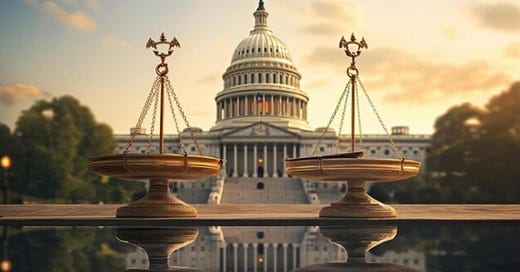When One Man Decides: Trump, Iran, and the Collapse of Congressional Power
Trump’s Iran standoff shows what happens when presidential instinct replaces democratic process.
Over the past week, the U.S. has edged dangerously close to a new military conflict in the Middle East. The fragile nuclear negotiations with Iran, initiated earlier this spring, intending to revive diplomacy, collapsed abruptly after Israel launched a major airstrike on Iranian nuclear facilities. Iran responded with missile and drone attacks. The U.S., though not yet a declared participant in the conflict, has begun moving aircraft carriers into the Mediterranean, raising its military alert posture across the region.
President Trump, in characteristic fashion, has issued a string of contradictory public statements. One day, he demands Iran’s “unconditional surrender”; the next, he muses that “no one knows what I’m going to do.” Meanwhile, Director of National Intelligence Tulsi Gabbard testified that U.S. intelligence still finds no evidence that Iran is building a nuclear weapon, a claim Trump openly dismissed. Security council meetings have been held. Talks have been canceled. Troops are moving. And Congress? For the most part, it’s watching from the sidelines.
To their credit, a small group of lawmakers in both chambers, led by Senators Tim Kaine and Bernie Sanders and Representatives Ro Khanna and Thomas Massie, have introduced legislation to block unauthorized military action in Iran. Sen. Tammy Duckworth (D‑IL), an Iraq War veteran, issued a stern warning: “They must bring their case to Congress… our troops should never be chess pieces in some reckless ideological game.”
However, these bills, like so many before them, are likely to face partisan inertia, presidential opposition, and legislative gridlock. The broader question remains: What happens to a republic when the branch of government closest to the people no longer exercises its power?
We just hit 15,000 subscribers—thank you!
Get exclusive access for just $1/week or $52 a year.
Get exclusive analysis and fearless reporting you won’t find in corporate media.
How We Got Here: The Collapse of War Powers
Despite the Constitution placing the power to declare war squarely in the hands of Congress, the United States has not formally declared war since World War II. Yet American forces have been deployed in over a dozen armed conflicts since then, from Korea and Vietnam to Iraq, Libya, Syria, and beyond.
This shift began in earnest with the Korean War, which President Truman launched as a “police action” under the United Nations Charter. It deepened in Vietnam, where the Gulf of Tonkin Resolution became a de facto declaration of war without limits or oversight. The 1973 War Powers Resolution was meant to restrain this trend, but it’s rarely enforced and easily circumvented.
After 9/11, the 2001 and 2002 AUMFs became open-ended justifications for U.S. military operations across the globe. Presidents of both parties have invoked them to justify everything from drone strikes in Somalia to special forces in Niger. Congress has rarely shown the political will to repeal or revise them.
What we’re seeing now with Iran isn’t an aberration. It’s the predictable result of a system that has redefined war as a presidential decision, not a congressional debate.
A History of War Without Debate
The argument for restoring congressional war powers is grounded in a century of U.S. history marked by wars launched without public consensus, meaningful congressional scrutiny, or transparent justification.
Even World War II was deeply unpopular before the attack on Pearl Harbor. Roosevelt waited for external justification. Korea was labeled a UN police action. Vietnam ballooned under vague pretexts. Iraq was sold on falsified intelligence. Afghanistan went on without updated authorization.
In 2003, President George W. Bush redirected post-9/11 policy toward Iraq, a country uninvolved in the attacks. While intelligence pointed to Saudi Arabia and Gulf-linked financing, many later acknowledged a personal vendetta against Saddam Hussein, driven by Bush’s family legacy. The war destabilized the region for decades.
That war, like so many others, proceeded because Congress failed to act as a check.
And today, the cycle repeats. Donald Trump ran twice, on a platform of isolationism, vowing to end “forever wars.” It was a message that resonated deeply. Yet just six months into his second term, the U.S. stands at the brink of another Middle Eastern conflict. This isn’t just hypocrisy; it’s a stark reminder that foreign policy shaped by one man’s instincts can override even the most explicit popular mandate.
What the Founders Intended
The erosion of congressional power is not just a modern governance issue; it’s a direct contradiction of what the Constitution was built to prevent.
The Founders were deeply skeptical of concentrated executive authority. Having just fought a revolution against monarchical rule, they designed a system meant to disperse power, encourage debate, and slow decisions that could lead to war or tyranny. Central to this design was a Congress with primacy over war, taxation, and legislation.
James Madison, often called the father of the Constitution, wrote:
“In no part of the Constitution is more wisdom to be found than in the clause which confides the question of war or peace to the legislature and not to the executive department.”In Federalist No. 47, he warned:
“The accumulation of all powers, legislative, executive, and judiciary, in the same hands … may justly be pronounced the very definition of tyranny.”Thomas Jefferson feared the emergence of what he called “an elective despotism,” where a single leader governs unchecked simply because voters chose them.
Even George Washington, himself a former general, emphasized restraint:
“The spirit of encroachment tends to consolidate the powers of all the departments in one, and thus to create, whatever the form of government, a real despotism.”
Congress comes first—Article I—not by accident, but by design. The legislative branch was meant to be the most powerful, the most responsive, and the most directly tied to the people.
Executive Overreach Isn’t Limited to War
War powers are the most dangerous example of congressional erosion, but they are far from the only one. Presidents, particularly Trump, have increasingly relied on executive orders, emergency declarations, and administrative rulemaking to impose sweeping changes without congressional approval.
Trump has issued hundreds of executive orders during his two terms, many of which are broad and often challenged in court, and can be easily reversed by his successors. From immigration bans to climate rollbacks, from pandemic policy to education, these orders have become the de facto method of governing.
See our previous reporting on the undermining of the separation of powers here:
Note: Some of these articles are more than 45 days old and now live in the archive. Become a paid subscriber for the nearly 700 article archive and exclusive access.
These orders are often rushed, legally vulnerable, and disconnected from the deliberative process. They undermine stability and deepen partisanship.
This style of governance is not unique to Trump, but it is more brazen, frequent, and volatile under his leadership.
The Legal and Political Consequences
When executive power supplants legislation, the results are not only undemocratic but also unstable and chaotic.
Legally, executive orders and military actions launched without congressional approval are immediately vulnerable to court challenges. We’ve seen it repeatedly: immigration bans blocked and unblocked across federal courts; environmental rules whiplashed from enforcement to suspension; military operations justified under outdated authorizations that courts struggle to interpret.
This legal uncertainty creates real-world consequences. Government agencies hesitate to act, unsure if policies will survive the subsequent lawsuit or election. International allies don’t know whether to trust America’s word. Citizens live under a cloud of uncertainty, subject to laws and orders that might be revoked tomorrow.
Politically, the shift to executive governance has eroded the very idea of stable, consensus-based policy. Every presidential election becomes an existential struggle because the next president’s pen can rewrite every policy.
This is not a sustainable system. It’s a constitutional gray zone, and it’s getting darker.
Congress’s Role: Willful Abdication
This imbalance didn’t happen because the presidency seized power overnight. It happened because Congress gave it away slowly, deliberately, and with bipartisan cooperation.
When faced with tough decisions on war, trade, surveillance, or national emergencies, many lawmakers prefer to defer to the executive, avoiding accountability while preserving their political capital.
Sen. Tim Kaine (D‑VA) emphasized:
“We shouldn’t be in a war if Congress doesn’t have the guts to debate it and vote on it… whether we should hide in the tall grass, rather than exercise our constitutional responsibility under Article I.”Rep. Thomas Massie (R‑KY), with Ro Khanna, said:
“The Constitution does not permit the executive branch to unilaterally commit an act of war… Congress has the sole power to declare war against Iran.”
However, not all lawmakers support these efforts to reassert congressional authority. Senate Majority Leader John Thune (R‑SD) criticized the proposed restrictions, saying, “We're getting the cart ahead of the horse here.” He argued that such legislation presumes action that hasn’t happened and could constrain the president in a time of escalating conflict.
Similarly, Sen. Josh Hawley (R‑MO) downplayed concerns about executive overreach, stating, “There’s very little danger of President Trump leading the U.S. into war.”
These voices reflect a persistent divide: while some demand oversight and constitutional fidelity, others prioritize executive agility in a volatile world.
Meanwhile, President Trump continues to post volatile and often contradictory statements across social media:
These posts now serve as substitutes for congressional debate. That’s not just dysfunctional; it’s dangerous.
Why It Matters: The Public Loses Power
When Congress abdicates, the public is silenced.
Congress is the only branch where the public has direct, routine access to decision-makers. Its members are accountable to small districts, reelected regularly, and responsive to constituent pressure. It is the people’s branch, by design.
It was designed to be slow, forcing compromise, building coalitions, and preventing rash decisions. That slowness is a democratic feature, not a flaw. It ensures that laws are grounded in broad legitimacy and public engagement.
Presidents can act quickly, but speed is not wisdom. And when all power resides in one office, even policies endorsed by the people—like Trump's promise of isolationism—can be discarded on a whim.
The result is a volatile, winner-take-all system where nothing lasts and no one is heard.
What Must Be Reclaimed
Reclaiming war powers is a necessary first step, but it's only the beginning.
Repeal the 2001 and 2002 AUMFs.
Enforce the War Powers Resolution.
Reassert congressional control over trade, emergency declarations, and regulatory mandates.
Invest in congressional capacity: more staff, more hearings, more courage.
If Congress won’t reclaim its role, then the republic it was built to serve may soon become something else entirely.
This Crisis Isn’t Unique—It’s a Pattern
We are not on the edge of crisis solely because of Trump. We are here because Congress has forgotten how to be Congress, or doesn’t have the stomach to legislate, instead preferring to posture on social media and television.
Restoring democratic balance isn’t about opposing a president; it's about upholding the principles of democracy. It’s about remembering what self-government requires: a legislature that legislates, a people that participates, and a system where power flows through deliberation, not decree.
As Franklin warned: “A republic—if you can keep it.” Whether we still can may depend on whether Congress remembers how.
Reclaim the Power That Was Yours
This isn’t just about history or theory; it’s about the structure of power in our democracy right now. And it won’t change unless we make it.
Call Congress
Call the Capitol switchboard: (202) 224-3121
Ask to be connected to your Senators and House Representative. You can use this simple script:
“Hi, my name is [Your Name], and I’m a constituent from [Your City]. I’m calling to ask [Senator/Representative Name] to publicly oppose any unauthorized military action in Iran and to support legislation that restores Congress’s constitutional authority over war powers. This is a matter of democratic accountability and national stability. I want my representative to lead, not defer.”
Support Groups Fighting for Accountability
Consider donating to or volunteering with watchdog organizations and grassroots coalitions working to restore constitutional balance:
Demand Progress – Advocacy for democracy, transparency, and anti-war reform
Win Without War – Coalition championing peaceful, progressive foreign policy
Protect Democracy Project – Legal and research efforts to defend democratic institutions
Just Foreign Policy – Transpartisan organization advocating principled U.S. foreign policy
Change doesn’t start in Washington. It begins with pressure, noise, and showing up.
If Congress won’t reclaim its power on its own, the public will have to demand it.
We just hit 15,000 subscribers—thank you!
Get exclusive access for just $1/week or $52 a year.
Get exclusive analysis and fearless reporting you won’t find in corporate media.
Bibliography:
“Duckworth: Trump Must Bring Military Action Before Congress.” Illinois Public Radio, June 18, 2025.
“Duckworth Unloads on Trump over Possible Attack on Iran.” Crain’s Chicago Business, June 2025.
“Video: Kaine Speaks on Senate Floor Regarding His War Powers Resolution to Prevent War with Iran.” Office of Senator Tim Kaine, June 2025.
“House Joins Senate in Push against War with Iran.” Responsible Statecraft, June 2025.
“US Lawmakers Introduce Resolution to Limit Unauthorized Military Action against Iran.” Anadolu Agency, June 17, 2025.
“Lawmakers Seek to Limit Trump From Dragging U.S. Into Israel-Iran War.” TIME, June 17, 2025.
“'Not our war': bipartisan US lawmakers back resolution to block involvement in Iran.” Guardian, June 17, 2025.
“House Republican, Democrat move to limit Trump from entering Iran war.” Axios, June 17, 2025.
“Senate Majority Leader John Thune dismisses calls for Iran war powers resolution: ‘Getting the cart ahead of the horse.’” New York Post, June 18, 2025.
Madison, James. “In No Part of the Constitution Is More Wisdom to Be Found …” Liberty Fund/Oxford, 1793.
Madison, James. “The accumulation of all powers … may justly be pronounced the very definition of tyranny.” The Federalist Papers, No. 47, Avalon Project, Yale Law School.
Washington, George. “The spirit of encroachment tends to consolidate the powers … a despotism.” Farewell Address, September 17, 1796. Library of Congress.










Trump has lost his mind...
Netanyahu has been trying for decades to get the US involved in a war with Iran. His goal is to control the entire region from Gaza to Iran. And by coercing t into using US hardware, he sees the opportunity to make this power grab a reality. If t-Rump green lights bombing Iran they will undoubtedly retaliate. By committing some form of terrorism on US soil. Of course, Netanyahu doesn't care because his country doesn't have to deal with the consequences.